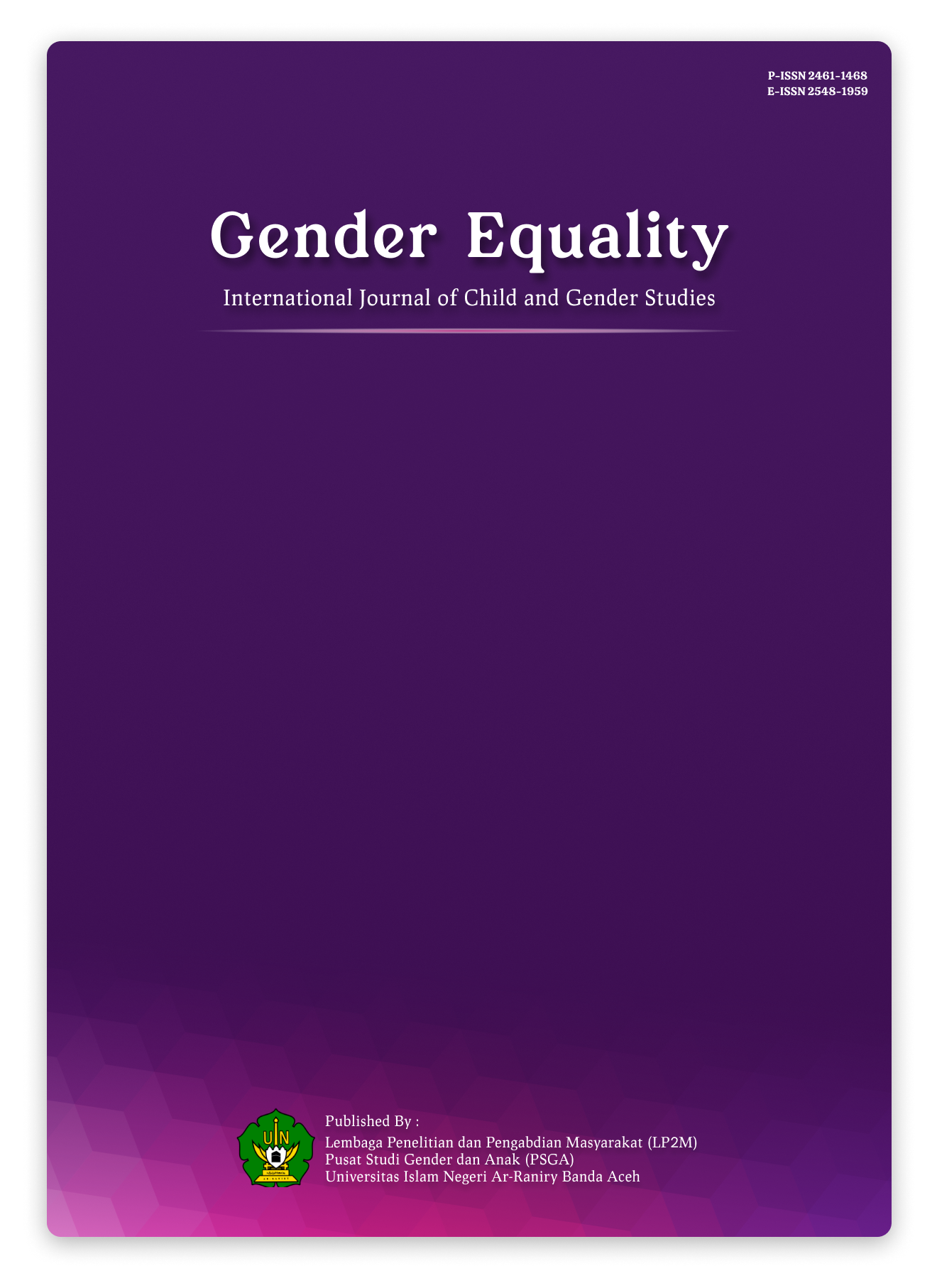Descriptive analysis of the implementation of gender responsive policies for poverty alleviation in Aceh
DOI:
https://doi.org/10.22373/equality.v11i1.28706Keywords:
Gender Poverty, Economic Empowerment, Policy Implementation, Women’s Welfare, Gender EqualityAbstract
Women’s poverty in Aceh persists due to entrenched gender norms restricting their economic access and social welfare, despite the poverty alleviation efforts. Gender mainstreaming policies (GMP), initiated through Presidential Instruction No. 9/2000, remain ineffective due to weak institutional coordination, inadequate funding, and exclusion of women in planning. This qualitative study analyzes policy implementation via document reviews, observations, and interviews, revealing multidimensional challenges. Institutional fragmentation, short-term program focus, and financial constraints limit women’s empowerment. Women’s exclusion from policy planning further reduces program ownership and engagement. Field data underscore women’s undervalued economic roles in coastal and agricultural sectors. In fishing communities, women contribute to fish processing, while female coffee farmers in Bener Meriah manage harvesting and small businesses. However, restricted access to resources, credit, and decision-making stifles their potential. To address these gaps, the study advocates strengthening institutional collaboration, increasing gender-responsive budgets, and integrating women into planning and evaluation. Sustainable outcomes require prioritizing long-term strategies with robust monitoring. Enhancing resource access, financial support, and decision-making power for women is critical to reducing poverty and advancing gender equity. These reforms aim to transform policy frameworks into actionable, inclusive solutions, ensuring Aceh’s poverty alleviation efforts align with the needs and contributions of its women.References
Abd Majid, M. S. (2014). Analisis tingkat pendidikan dan kemiskinan di Aceh. Jurnal Pencerahan, 8(1). https://doi.org/https://doi.org/10.13170/jp.8.1.2040
Agusalim, L., Sulistiyowati, S., & Amalia, S. N. (2023). Gender dan pembangunan ekonomi: Studi lintas provinsi di Indonesia. Malang: Madza Media.
Arifianti, S. M., Nasution, Y. S. J., & Atika, A. (2024). Empowering family resilience: Muslim women’s impact in Perbaungan. Gender Equality: International Journal of Child and Gender Studies, 10(2), 244-254.
Bustamam Ahmad, K. (2002). Islam historis: Dinamika studi Islam di Indonesia. Yogyakarta: Jogja Bangkit Publisher.
Bustamam Ahmad, K. (2017). Acehnologi Volume 4. Banda Aceh: Bandar Publishing.
Cibro, R. (2018). Dari Islam politik ke Acehnologi biografi pemikiran Kamaruzzaman Bustamam- Ahmad. At-Tafkir, 11(2), 18–39. https://doi.org/10.32505/at.v11i2.733
Djunaidah, I. S., & Nurmalia, N. (2019). Peran produktif wanita pesisir dalam menunjang usaha perikanan di kecamatan Tempuran, kabupaten Karawang. Jurnal Sosial Ekonomi Kelautan Dan Perikanan, 13(2), 229-237. https://doi.org/10.15578/jsekp.v13i2.6980
Guio, A. C. (2018). Multidimensional poverty and material deprivation: Empirical findings. In Handbook of Research on Economic and Social Well-Being (pp. 171-192). Massachusetts: Edward Elgar Publishing. https://doi.org/10.4337/9781781953716.00011
Hasan, Z. (2021). The effect of economic growth and human development index on poverty in Indonesia. Journal of Economics and Sustainability, 3(1), 42–53. https://doi.org/10.32890/jes2021.3.1.5
Junaedi, W. R., Waruwu, D., Ichsan, I., & Damayana, I. W. (2020). Meugoe (Mengembalikan kemandirian dan kejayaan ekonomi Aceh). Jawa Tengah: CV Sarnu Untung.
Li, W., & Marshall, M. I. (2019). Gender and business owner satisfaction: The case of farm and non-farm family businesses in the Midwest. Journal of Family Business Management, 9(4), 416–428. https://doi.org/10.1108/JFBM-12-2018-0059
Lukman, J. P. (2024). Pemberdayaan perempuan sebagai poros utama pembangunan berkelanjutan: membangun kesetaraan, kesejahteraan, dan keseimbangan lingkungan. Journal of International Multidisciplinary Research, 2(8), 88–97. https://doi.org/10.62504/jimr822
March, C., Smyth, I. A., & Mukhopadhyay, M. (1999). A guide to gender-analysis frameworks. Oxfam.
Mirnalisa, C. T., & Permana, I. M. (2020). Feminisme dalam islam sudut pandang Aceh. Bogor, Jawa Berat: Guepedia.
Moser, C. (2012). Gender planning and development: Theory, practice and training. London: Routledge.
Musdawati, M. (2024). Feminisasi kemiskinan dan pendidikan di Aceh Besar. Intelektualita, 13(1), 172–190. https://doi.org/http://dx.doi.org/10.22373/ji.v13i1.25623
Ramly, A., Abd Majid, M. S., & Indriani, M. (2020). Effects of capital and type of business on coastal muslim women’s business income in Aceh Province. Islam Universalia: International Journal of Islamic Studies and Social Sciences, 1(3), 460–477. https://doi.org/10.56613/islam-universalia.v1i3.141
Ramli, R. (2022). Kontribusi studi kawasan bagi paradigma keilmuan Acehnologi. Bidayah: Studi Ilmu-Ilmu Keislaman, 13(1), 1–20. https://doi.org/10.47498/bidayah.v13i1.683
Rasyidah, R., Munawiah, M., Ismiati, I., Nashriyah, N., Khairani, K., & Jamhuri, J. (2016). Masculinities in post conflict Aceh and its impacts on violence against Women. Banda Aceh: Ibnunourhas Publishing.
Setyadi, A. (2022). Data BPS: Aceh masuk 5 provinsi miskin di Indonesia. Detiknews. https://news.detik.com/berita/d-5925014/data-bps-aceh-masuk-5-provinsi-miskin-di-indonesia
Tjhin, C. S. (2005). Post tsunami reconstruction and peace building in Aceh: Political impacts and potential risks. Centre for Strategic and International Studies.
Umar, R., & Putri, G. S. (2023). Aceh Provinsitermiskin di Sumatera, warga miskin naik jadi 818 ribu orang. Kompas.Com. https://regional.kompas.com/read/2023/01/17/155856778/aceh-provinsi-termiskin-di-sumatera-warga-miskin-naik-jadi-818-ribu-orang
Zainal, S. (2022). Keistimewaan Aceh dan pembangunan perdamaian dalam tinjauan sosio historis. Jurnal Sosiologi USK (Media Pemikiran & Aplikasi), 16(1), 87–104. https://doi.org/10.24815/jsu.v16i1.25706
Downloads
Published
Issue
Section
License
GENDER EQUALITY: International Journal of Child and Gender Studies allows the author(s) to hold the copyright and to retain the publishing rights without restrictions. Authors who publish with this journal agree to the following terms:
- Authors retain copyright and grant the journal right of first publication with the work simultaneously licensed under a Creative Commons Attribution License that allows others to share the work with an acknowledgment of the work's authorship and initial publication in this journal.
- Authors are able to enter into separate, additional contractual arrangements for the non-exclusive distribution of the journal's published version of the work (e.g., post it to an institutional repository or publish it in a book), with an acknowledgment of its initial publication in this journal.
- Authors are permitted and encouraged to post their work online (e.g., in institutional repositories or on their website) prior to and during the submission process, as it can lead to productive exchanges, as well as earlier and greater citation of published work.


